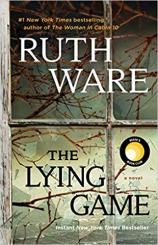Reading Group Guide
Discussion Questions
The Lying Game

1. Describe the Lying Game and its rules. What inspired Thea originally to come up with the idea for the game? Why do she and Kate decide to include Fatima and Isa in the Lying Game? What about the game is appealing to the girls?
2. Isa says that Kate “knows what we’ll say --- what we’ve always said, whenever we got that text” (p. 5). Were you surprised by how quickly Isa, Fatima, and Thea rushed down to Salten upon receiving Kate’s text? Why do they rush to her aid so quickly? Do you have any friends whom you would do the same for?
3. Describe the Tide Mill. What role has it played in the adolescence of the girls in the clique, and why is it so important to Kate, in particular? Isa is convinced that Kate will never leave the Tide Mill or Salten. Did you think she was correct in her assessment as the novel progressed? Why might Kate be unwilling or unable to leave?
4. When Isa and her friends reunite at Salten seventeen years after they have been dismissed from school there, Thea gives the same toast that she gave when they were students: “To us... May we never grow old” (p. 56). What is Isa’s reaction to Thea’s toast? Were you surprised by it? Why do you think Isa reacts the way she does? How has she changed since leaving Salten as a student?
5. Each section of THE LYING GAME begins with a rule from the game. What’s the effect of having the rules as chapter headings? How do they inform your reading of the story?
6. Isa says, “I once tried to describe Ambrose to an old boyfriend...but I found it almost impossible” (p. 73). How would you describe Ambrose? What kind of a teacher and parent was he? Mary Wren says that Ambrose would have done anything for his children whereas Fatima describes him as “an irresponsible fool” (p. 243). Why do each of the women feel so differently about Ambrose? What did you think of him?
7. Isa’s housemistress tells her, “I’m very glad you’ve found friends. But remember, part of being a well-rounded young woman is having a wide variety of friends” (p. 99). Do you agree with the housemistress? What were some of the benefits of having such close friends? Mary describes Isa and her friends as a “little clique” (p. 105). Is that an accurate description? How does Isa feel about Mary’s description and the clique itself as an adult? Were there any disadvantages to being part of it?
8. Rick praises Kate for staying in Salten, telling her, “Your dad was a good man, no matter what others in this place say, and you done well to stick it out here with the gossips” (p. 23). Do you think that Kate is brave for staying in Salten? Why or why not? Discuss some of the rumors about Kate and her father. What are they? Why might the townspeople find them plausible? Were there any rumors that you thought had merit? Which ones and why?
9. On Isa’s first morning back at the Mill, Kate discovers a dead sheep. Who or what did you think was responsible for the sheep’s death? Why? Describe the note that Isa finds in Kate’s pocket. What does it say? Although Isa’s initial impulse is to tell Fatima, “a kind of instinct takes over” (p. 88). Why doesn’t Isa tell Fatima about the note? Would you?
10. When Isa reflects upon the events that took place, she muses that she will tell Freya “a story about bravery, and selflessness, and sacrifice” (p. 366). Do you agree with Isa? Do any of the characters in THE LYING GAME embody the traits that Isa enumerates? If so, who? How would you characterize the events that have taken place at Salten both during Isa’s school days and at the friends’ reunion?
11. When describing the events that happened shortly before their expulsion from Salten, Thea proclaims that the girls had no choice but to take the actions that they did. Do you agree with Isa when she cries, “Of course we had a choice!” (p. 197). Why or why not? Why might the girls have felt that they had no other options in the moment? Do you think that Kate took advantage of her friends when she asked for their help? If so, how?
12. Although Isa wants to tell Owen what she and her friends did while they were students at Salten, she feels she “can’t. Because it’s not only my secret --- it’s theirs, too. And I have no right to betray them” (p. 223). Do you agree with Isa’s decision to withhold this information from Owen? Explain your answer. Do you think that there are any instances when it is permissible to betray a shared secret? If so, what are they?
13. Isa says that she and her friends “have spent seventeen years running and hiding, in our different ways” (p. 93). What are they hiding from? Describe the ways that each of the women has attempted to run from their shared past. Have any of their attempts been successful? Why or why not?
14. What were your initial impressions of Luc? Did you trust him? Why or why not? Describe his relationship with Ambrose and Kate. Were you surprised by his anger as an adult? Why does he harbor such resentment toward Kate? Do you think he is justified in doing so?
The Lying Game
- Publication Date: March 6, 2018
- Genres: Fiction, Psychological Suspense, Psychological Thriller, Suspense, Thriller
- Paperback: 416 pages
- Publisher: Gallery/Scout Press
- ISBN-10: 1501156209
- ISBN-13: 9781501156205







